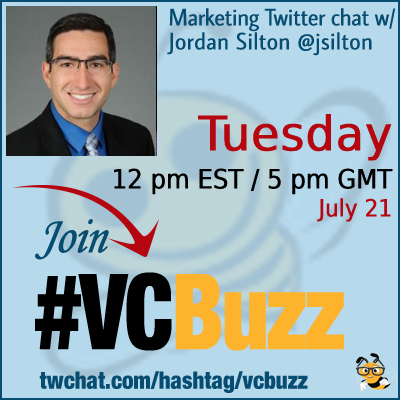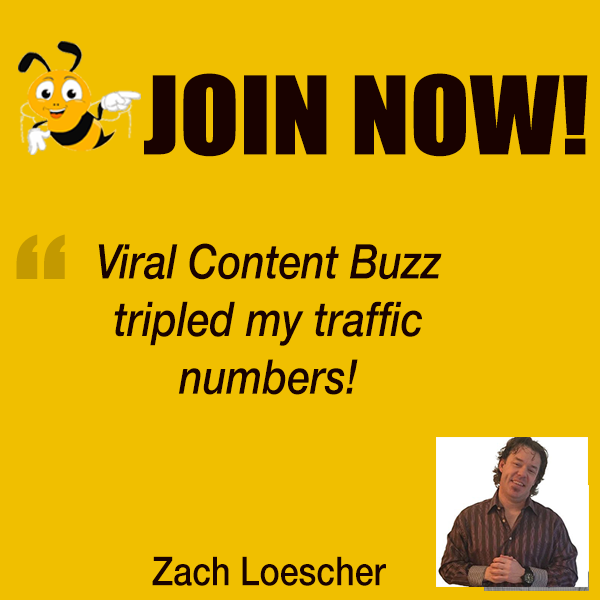
Enterprise SEO is extremely challenging because you have to deal with huge websites and organizational silos inside the company.
What are the most important and challenging aspects of enterprise SEO and how to handle them?
Let’s discuss!
***Add #VCBuzz chats to your calendar here.
***Please sign in here to follow the chat -> twchat.com/hashtag/vcbuzz
About Jordan Silton @jsilton
Jordan Silton @jsilton is senior director, SEO and analytics at @apartmentscom.
Before working at Apartments.com, Jordan crafted and executed SEO and digital media strategies for clients such as Alston & Bird, AT&T, Atlanta Ballet, Cartoon Network, GameStop, Kimberly-Clark, Lowe’s, NASCAR and Zaxby’s while at Search Discovery and Relevance Advisors.
Questions we discussed
Q1 How did you become a digital marketer? Please share your career story!
My career as a digital marketer started in college at @EmoryUniversity. My resident assistant (RA) was a marketing major at @EmoryGoizueta and I was confident I did not want anything to do with marketing.
However, I was quite sure that I wanted to go to business school, and I did end up taking all the pre-requisites at @EmoryGoizueta before finding that my passion did in fact lead to marketing as a focus.
My first job out of college was in paid search, working with @benjaminrudolph, @LeeTBlankenship, and @cbeltranatlanta at @searchdiscovery on accounts like NASCAR and others.
From there, I expanded my skillset beyond paid search to analytics and SEO. I found SEO really rewarding, and continued to dive deeper and learn more.
SEO is something that I have been doing for about a decade now, and it’s interesting to see my career shifting to continue to focus on SEO, but in an enterprise setting you need to know much more than SEO to be good at it
For example, analytics and data science are critical, which is where I am currently spending a lot of my time and energy.
Q2 What makes enterprise SEO different from a normal campaign?
Any time you think about SEO, I think you need to look past the concept of a “campaign”. Marketing and PR have campaigns that start and end. There may be campaigns or projects within SEO, but I think SEO is a mindset.
SEO at an enterprise level is about finding all the different pieces and parts of a business that contribute to a successful experience on your site(s). Enterprise SEO is more than title tags, redirects, canonicals, content, and things in a typical SEO audit.
a2 Enterprise SEO has its own unique challenges
— Debi Norton (@BRAVOMedia1) July 21, 2020
– many in-house departments to deal with
– slow to approve / implement SEO recommendations
– usually dealing with thousands of URL's
– they don't let you into the CODE#VCBuzz
Enterprise SEO is about finding opportunities within an organization that will impact the online experience, and figuring out how to overcome all those hurdles and improve things for your customers.
For example, the fix to an issue with canonical URLs or broken internal links may accomplished by solving an an underlying issue in an internal dataset. You don’t just get to make recommendations, you need to figure out the core problem.
A2 One main thing that sets enterprise SEO apart is how deep you can get into the data. When you are trying to rank for hundreds of thousands of keywords and managing/optimizing millions of pages, learning how to sift through data to help with strategy becomes vital. #vcbuzz
— Boyd Norwood ?? (@boydnorwood) July 21, 2020
To that point, I think collaboration is key. Also, things like being a better manager, and growing the talent on your team are all critical. Things that help me most with Enterprise SEO are often the intangibles, as opposed to technical knowledge.
A.2 More pages that need more results are more challenging. With Enterprise SEO, the approach needs to be more strategic & goal oriented. The upward scale and results of the site’s performance require skills more than what a traditional SEO would demand. #vcbuzz
— Dakshin Adyanthaya (@upsidedakshin) July 21, 2020
Technical expertise is helpful, don’t get me wrong, but just knowing what to do is such a small part of the picture. It’s more about understanding how to conduct the orchestra than knowing what piece of music to play.
A2. Adding to @BRAVOMedia1 great list:
— Jeannie Hill (@essentialskill) July 21, 2020
– many teams competing for the same budget
– lack of response time to suggestions from internal slow workflow processes
– product categories aren't built out the best for #enterprise #SEO
– #webdev isn't current on schema #VCBuzz https://t.co/HUAb4eZFuV
A2 simply .. scale. Scale of keywords. Scale of people to talk to. Scale of people to get approval from.
— Phil Drinkwater (@phil_drinkwater) July 21, 2020
But eventually it will boil down to campaigns to solve Seo problems. Just at a different scale! #vcbuzz
Q3 What is the most important aspect of enterprise SEO: links, content or technical? Which one (and why) is the most challenging?
I would say that technical SEO, to a point, is the most important for short-term success. You can go into a big company with good content or bad content, few links, or a lot of links, and make some important technical fixes then see results.
To me, enterprise SEO also overlaps with big/large website SEO. That means there are a lot of pages involved, and lots of opportunities for technical SEO issues to arise. Quick wins and low hanging fruit often come from technical fixes.
A3. #Enterprise #SEO has become more complex that signally out one key aspect. You need all 3 to win in competitive niches in the long run. The biggest challenge is the skill of how each one – links/content/technical influence each other and how to maximize them together. #VCBuzz https://t.co/vvUXTrIzSb
— Jeannie Hill (@essentialskill) July 21, 2020
Over the long-term, I think content becomes the biggest overall opportunity. I don’t mean blog posts and articles (unless you are a media company), I mean overall content assets and the value that you can provide to a user. Without top content, success won’t last.
If you have a well-functioning site that checks most of the technical SEO boxes and you have top notch content, then links and popularity are a great multiplier.
I suspect that one challenge in handling #enterprise #SEO is having multiple people with the ability to add and delete content. It used to frustrate me that corporations tended to delete content willy-nilly. #vcbuzz
— Gail Gardner (@GrowMap) July 21, 2020
My first day at @apartmentscom right around the time we ran the first Super Bowl commercial that had ever been done in our industry. That was certainly a nice tailwind to help with building brand authority and awareness.
A3a I would say they are all equally important. The one that needs the most focus at the moment depends on the one that has been neglected the most.
— Boyd Norwood ?? (@boydnorwood) July 21, 2020
The most challenging in a boring or highly regulated industry is content. #vcbuzz https://t.co/8Ul9cHkcLK
On its own, the commercial had value. As a component alongside a long-term commitment to SEO, it was just the beginning.
A3c Link building can be the most difficult in some industries but can be fairly easy in others.#vcbuzz
— Boyd Norwood ?? (@boydnorwood) July 21, 2020
They are all important. I’m not sure they are all equal in every case. Up to a certain point, each one on its own can only get you so far. You need all three for long-term sustainable success.
A.3 I personally feel it is Technical.
— Dakshin Adyanthaya (@upsidedakshin) July 21, 2020
Challenges with optimising & re-optimising content basis search volumes and not just creating more content but timely ensuring it is best optimised, needs more of your skill, time and understanding. #vcbuzz
A3 the starting point is always which one is letting the side down most. Technical Seo is the “easiest” to fix, so always do that.
— Phil Drinkwater (@phil_drinkwater) July 21, 2020
Link strength, but poor content? Start with content, keywords and strategy.
Great content but poor quality links? Start with links.
#vcbuzz
Q4 One of the biggest issues we have come across when working with enterprise clients is overcoming organizational silos. It is never easy to get anything done with the site when having to sell those pages to various departments and decision makers. How are you dealing with this issue?
Organizational silos can get overwhelming very quickly. It’s extremely important to demonstrate success and overcome adversity several times with modest or moderate challenges before trying to do too much too fast.
A4. Organizations that have a culture that embraces agile marketing understand that making workflows and permissions easy empowers teams. Former silos are today's barriers to moving fast enough to keep up with evolving consumer needs. #vcbuzz https://t.co/ZPHEsMclgB
— Jeannie Hill (@essentialskill) July 21, 2020
One trap I see people fall into is saying the only way to success is with a huge outrageous project that involves every part of a business. Those types of projects get accomplished once a year, or once every couple of years.
A4 it depends on the exact issues. Infighting? Lack of direction? Contradicting desires?
— Phil Drinkwater (@phil_drinkwater) July 21, 2020
For me, I start with common ground, reasonable compromise and – most of all – re-stating that everyone wants the same; to succeed. #vcbuzz
The best thing you can do to overcome organizational silos is to show your track record of success and build bigger and bigger wins involving more and more teams.
A.4 The need to collaborate is very crucial. The impact of working in silos can be ruthless. And hence we encourage a collaborative and proactive approach sitting with the departments & stakeholders and jointly mapping responsibilities, data, ideas and outcomes. #vcbuzz
— Dakshin Adyanthaya (@upsidedakshin) July 21, 2020
Not only do you get better at navigating those silos yourself, but it will be easier to get buy-in since you will have more advocates and case studies of your accomplishments.
a4 This is so true!
— Debi Norton (@BRAVOMedia1) July 21, 2020
Collaborating is the KEY & making sure you're ready to explain the technical aspects of your recommendations to the entire IT team. Begins by gaining their respect, guiding them w/out being a threat.
Balancing ACT#VCBuzz
A4. How to overcome organizational silos:
— Jeannie Hill (@essentialskill) July 21, 2020
?Admit the old way is wrong
?Colaboration/Colaboration/Colaboration
?Combine #SEO with a brand-driven content strategy
?Create a deliberate digital presence capable of moving bottom lines
?Use #BigData with better insights #VCBuzz https://t.co/dlWVXQpBoP
Q5 What are your favorite digital marketing tools?
My first business card had a quote on the back (I didn’t write it), but it said something along the line of: “What are the best SEO tools?”
The answer is obvious: “Smart People”
Some tools I like right now include: @botify, @nozzleio, @contentking, @semrush, @ahrefs, @screamingfrog, and so many more.
A.5 Well, there are so many!
— Dakshin Adyanthaya (@upsidedakshin) July 21, 2020
Design: Crello & Canva
Video: Inshots, Premier Pro & AfterEffects
SEO: SEMrush, UberSuggest & AskThePublic
Content Management: Trello
Research: Fanpage Karma, SEMrush & SimilarWeb
Scheduling: TweetDeck & Buffer#vcbuzz
Beyond tools you can purchase, I have found that internal tools are underrated. Careful about how much time you spend on building something custom though. There’s a whole video on this topic from #TechSEOBoost if you want to dive deeper.
Our previous SEO chats:
- How to Win Against Biggest Brands in SEO with @HamletBatista
- SEO Entities and Google’s NLP with @KrystianSzastok
- How to Claim and Optimize Your Personal Google Knowledge Graph with Don Sturgill @DonSturgill
- How to Monitor Your Rankings with @MordyOberstein of @rankranger
- Schema for Content Marketers with Martha van Berkel with @marthavanberkel
- SEO Ranking Factors with Paul Baguley @BaguleyPaul
- How SEO Has Changed with Deborah Norton @BRAVOMedia1
- SEO Then and SEO Now with Bonnie Burns @Burnsie_SEO



